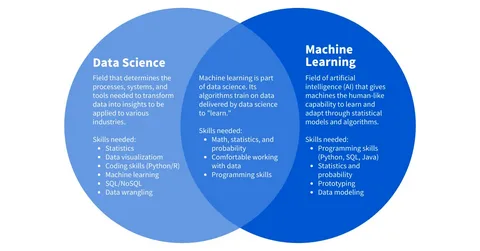The word “operating system” usually evokes thoughts of Windows, macOS, or Linux — the invisible layer that powers computers, managing hardware and software so users can focus on getting things done. But what if we reimagined this concept for data science? A “Data Science Operating System” (DSOS) would not just be about running programs; it would be about orchestrating the entire data lifecycle, from ingestion to deployment, in a coherent and intelligent manner. Unlike scattered tools and fragmented workflows, a DSOS would promise an integrated experience, much like how a traditional OS simplifies the complexities of computing.
Breaking Free from Fragmented Tooling
Today, data scientists juggle a patchwork of environments: Jupyter notebooks for experimentation, GitHub for version control, Docker for containerisation, cloud platforms for scaling, and dashboards for communicating insights. Each tool is powerful but loosely connected, leaving gaps where productivity often leaks. A DSOS would unify these elements. Imagine a single layer where coding, data exploration, model management, and deployment coexist seamlessly, without the friction of constant switching. It would turn the chaos of disconnected workflows into a symphony of coordinated processes.
A Core Kernel for Data Operations
Every operating system relies on its kernel, the heart that manages memory, scheduling, and system calls. In the world of data science, the kernel equivalent would be a resource allocator for data pipelines. This “data kernel” would oversee how data moves between storage, processing engines, and machine learning frameworks. It would balance workloads, optimise queries, and ensure fair resource distribution between competing models or experiments. Such a kernel could also act as a governance layer, enforcing compliance, access control, and auditability — critical in an era where trust in data is paramount.
A Native Package Manager for Algorithms
Operating systems thrive because of package managers that make installing software effortless. A DSOS would extend this idea to algorithms and pre-trained models. With a few lines of code, a practitioner could fetch a regression model tuned for healthcare, a deep-learning architecture optimised for computer vision, or a time-series forecaster built for finance. Crucially, this package manager would not only distribute algorithms but also metadata, including the provenance of the data used for training, ethical considerations, and performance benchmarks across various industries. It would accelerate innovation while setting new standards for transparency.
Interfaces for Humans, Not Just Machines
A striking limitation of current data tools is their bias towards coders. A DSOS would bridge this gap, offering native interfaces for multiple personas: analysts, executives, product managers, and regulators. Just as an OS provides both command lines for developers and graphical desktops for general users, a DSOS would deliver dashboards, visual programming environments, and natural-language query tools. This inclusivity would allow non-technical stakeholders to participate meaningfully in the data journey, democratising access without diluting rigour.
Security as a First-Class Citizen
Data is no longer just an asset; it is a liability if not managed securely. A DSOS would build security into its foundation rather than bolting it on later. It would provide encryption by default, role-based access to datasets, and automated detection of anomalies in model behaviour that could signal adversarial attacks. Think of it as an antivirus suite but tuned for the peculiar vulnerabilities of data-driven systems. With growing regulations like GDPR and India’s Digital Personal Data Protection Act, compliance baked into the operating system itself could save enterprises from costly missteps.
Continuous Learning as a System Service
Traditional operating systems maintain themselves with updates and patches. A DSOS would go further, embedding continuous learning into its services. Deployed models would not live in isolation but constantly check for concept drift, retrain when performance decays, and notify stakeholders about shifts in data quality. This capability would make machine learning systems truly adaptive, closing the loop between experimentation and production.
A Marketplace for Ethical Innovation
A crucial yet often overlooked dimension of today’s AI ecosystem is the challenge of integrating ethical frameworks into practical applications. A DSOS could feature a marketplace where datasets, models, and even fairness-checking modules are exchanged. Just as app stores revolutionised software, such a marketplace could accelerate responsible innovation. Developers could integrate pre-tested fairness constraints, bias-detection tools, or explainability layers into their projects without reinventing the wheel.
The Future of Collaboration
The most radical promise of a DSOS would be reimagining collaboration. Instead of emailing CSVs or pushing code snippets, teams could work in a shared operating environment. Versioning of not only code but also data, models, and experiments would become native. A data scientist in Bangalore could hand off a pipeline to a peer in London without compatibility nightmares. For learners enrolled in data science classes in Bangalore, such an ecosystem would also provide hands-on exposure to workflows that mirror enterprise-grade systems rather than piecemeal tools.
Why the Vision Matters Now
The idea of a DSOS may sound futuristic, but the timing is ripe. Cloud providers, open-source communities, and MLOps platforms are already piecing together fragments of this puzzle. What’s missing is the holistic vision — the leap from “tools that work together” to “an operating system that thinks in data.” As industries from healthcare to finance lean more heavily on AI, the demand for trust, reproducibility, and efficiency will only intensify. Those preparing to enter the field, perhaps through data science classes in Bangalore, will find themselves not just learning today’s methods but shaping the very foundation of tomorrow’s operating systems.
Conclusion
To imagine a Data Science Operating System is to imagine a world where complexity recedes and creativity expands. It would be a platform that not only executes tasks but also actively supports discovery, collaboration, and accountability. By fusing the principles of traditional operating systems with the demands of modern data practice, a DSOS could become the unseen architecture powering the next wave of innovation. The challenge is not only technical but cultural — aligning communities, industries, and regulators around a shared operating vision. But if history has shown us anything, it is that when computation finds its operating system, revolutions follow.



